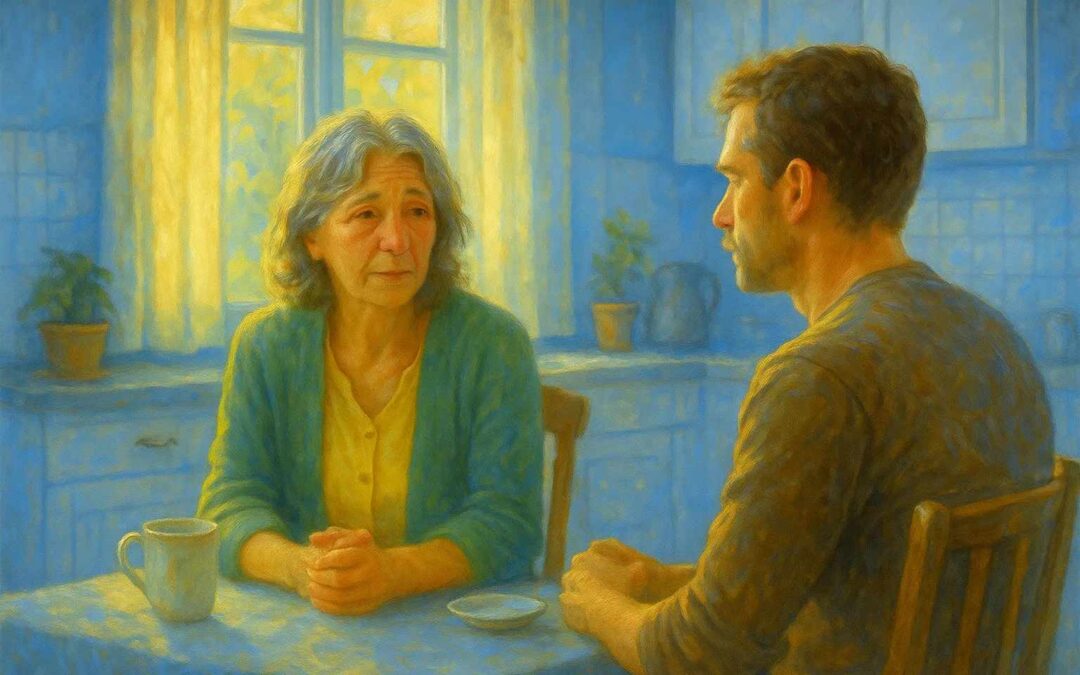The Warning in My Mother’s Voice
I can still hear my mother’s voice from years ago, slightly exasperated, as she flexed her fingers and winced. “It’s my arthritis again,” she’d say, usually while stirring a pot or folding laundry. Back then, I nodded sympathetically but didn’t think much of it. I was busy with my own life, and she, in her sixties, still seemed lightyears ahead of me in age and experience.
But lately—now that I’m where she was—I’ve come to understand that those offhand comments weren’t just complaints. Maybe they were quiet warnings. Not in a fearful sense, but in the way elders sometimes share things you won’t understand until you get there yourself. It wasn’t just about her joints. It was about the gentle erosion of certainty in your own body. About learning to live with slowness, with little losses. And about what it means to grow older not just physically, but spiritually and emotionally too.
The Conversations That Mark the Years
There’s a new kind of small talk that arises in this season of life. “Are you retired?” someone might ask at a gathering, in the same tone we once asked, “What do you do?” I find myself giving a short answer, but then leaning in, asking in return, “How are you spending your time these days?” Because that’s where the real conversation begins—how we spend our time when our identity isn’t tethered to a title or a paycheck.
There’s something sacred about these mid-life and older conversations. There’s a quiet intimacy to talking with someone who understands what it means to wake up with a stiff shoulder or to suddenly forget a name you’ve known for decades. We don’t laugh to mock—we laugh in solidarity. And we cherish old memories with old friends, even though many of us once swore we’d never become those older people reminiscing about “the good old days.” Yet here we are, grateful for the remembering, and for the company to do it with.
The Art of Letting Go
The experience of aging, for all its challenges, is also a slow invitation toward detachment—a concept St. Francis de Sales explored with incredible tenderness. He wrote about detachment not as a cold withdrawal, but as a loving release. He described it as a freedom that allows us to love more deeply, without self-interest or grasping. We begin to release the ambitions, roles, and possessions that once seemed so central, and in doing so, we make room for gentler things: presence, patience, compassion.
This kind of detachment feels different from giving up. It’s more like giving in—to grace, to time, to the rhythms of a life well-lived. As our bodies slow and our memories soften, our hearts open to the simplicity of just being. We’re no longer chasing what’s next. We’re noticing what’s here.
Patience, Especially with Ourselves
One of my favorite pieces of advice from St. Francis is this: “Have patience with everyone, but chiefly with yourself.” That line lands differently the older I get. When I forget why I walked into a room, or when my body aches in ways it didn’t used to, I try to remember that spiritual patience includes letting grace flow inward.
Aging asks for a gentleness we often reserved for others. Now it’s our turn to offer it to ourselves—to forgive the creaks and pauses, to sit with the moments when we’re not quite who we used to be, and to recognize that we’re still becoming.
A Holy Ordinary
In his writings, St. Francis often reminded readers that true holiness lies in the ordinary. Not in dramatic acts, but in doing small things with great love. I think of this when I see someone take a neighbor’s trash can in for them, or when I spend ten quiet minutes just watching the trees sway. In these simple acts, I’m learning to serve without striving. To be present without performing.
Even the daily inconveniences of aging can become sacred. A doctor’s appointment becomes a chance to check in not just physically, but spiritually. A slower pace forces us to notice more: the warmth of sun on the skin, the softness of a grandchild’s voice, the music of a friend’s laugh echoing across a kitchen table.
What the Years Teach Us
Looking back now, I think my mother was teaching me something when she rubbed her sore hands. Maybe she was inviting me, in her quiet way, to prepare—not to fear aging, but to grow into it with curiosity and grace. And maybe that’s what we’re all doing, in our own time: learning how to let go of what doesn’t serve us, holding onto what matters, and finding joy in the little signs that we’re still alive, still learning, still deeply human.
St. Francis de Sales called us to live devoutly, not dramatically, but devotedly. Aging, I’m learning, is a masterclass in that kind of devotion. It’s a slow, tender surrender to a love that has never been about doing more—but about becoming more ourselves, more gentle, more open to God, and more at peace.

